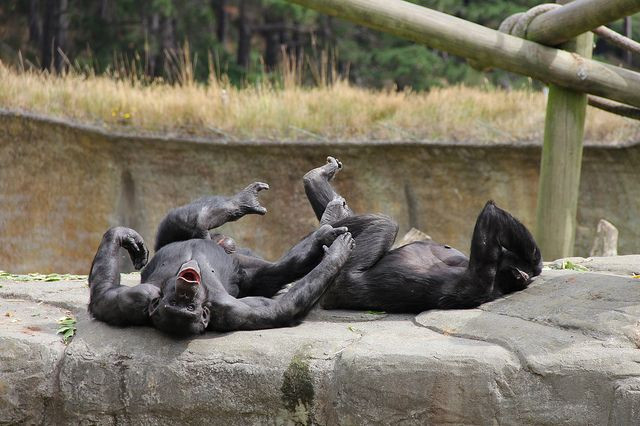Chimps' Working Memory Far Superior To Our Own; Chimpanzees Best Humans In Complex Tasks

Humans have nothing on chimps, at least when it comes to short-term memory. Notwithstanding their primitive lifestyles, chimpanzees exhibit a capacity for recognition and retention that dwarfs that of humans. Studies conducted in Japan show that in working memory tests, humans are consistently bested by their simian cousins.
The findings are part of an elaborate research effort by Tetsuro Matsuzawa, the director of the Primate Research Institute at Kyoto University. Over the past three decades, the professor of cognitive science has spent countless hours picking the brain of the primate that shares 98.8 percent of our DNA. Together with the 36-year-old chimpanzee Ai and her 13-year-old son Ayumu, Matsuzawa has made invaluable contributions to our current understanding of the ape’s mind as well as our own.
"We've concluded through the cognitive tests that chimps have extraordinary memories," Matsuzawa said, speaking to The Guardian. "They can grasp things at a glance. As a human, you can do things to improve your memory, but you will never be a match for Ayumu."
To appraise their respective mnemonic capacity, Matsuzawa enrolled humans and specially trained chimps in two memory experiments. In the first experiment, subjects were tasked with remembering the location of numerals one to nine spread randomly across a computer touchscreen. They were then asked to touch the numbers in ascending order. Once a subject touched number one, the other eight digits were immediately covered with white squares.
In the second experiment, subjects saw a sequence of five numbers flash briefly on the screen and turn into white squares. Once again, they were again asked to touch the tiles in sequence.
When the numbers were displayed for seven-tenths of a second, both chimps and humans could perform the task with an accuracy of about 80 percent. But while human accuracy declined as the exposure time decreased, that of the chimps remained largely the same, even at four-tenths of a second. According to Matsuzawa, the human inferiority is most likely the result of an evolutionary trade-off.
"Our ancestors may have also had photographic memories, but we lost that during evolution so that we could acquire new skills," he explained. "To get something, we had to lose something."
While humans have a very limited use for immediate retention and reaction, chimps depend on these abilities for survival on a daily basis. For them, a heightened working memory is critical to gathering food, thriving in a community, and fending off aggressive peers.
"They have to be able to think quickly because there are other hungry chimps behind them," Matsuzawa says. "They have to grasp the situation as quickly as possible and decide where to go."



























